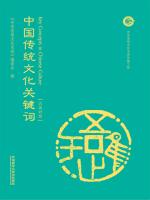Unveiling the Tapest
孙博文爱中国
Unveiling the Tapestry of Chinese Culture: A Review of Key Concepts in
Chinese Cultural Tradition Key Concepts in Chinese Cultural Tradition
is a meticulously crafted masterpiece that serves as a profound
exploration into the rich and ancient tapestry of Chinese culture. This
book, written by a team of renowned scholars, provides readers with an
in - depth understanding of the fundamental concepts that have shaped
Chinese society, philosophy, art, and daily life for millennia. The
book's strength lies in its comprehensive coverage of a wide range of
topics. It delves into philosophical concepts such as Confucianism,
Taoism, and Buddhism, which have been the guiding forces in Chinese
thought. For instance, the detailed explanation of Confucian values like
"Ren" (benevolence), "Li" (rites), and
"Xiao" (filial piety) offers readers a clear picture of how
these ideas have influenced social ethics, family structures, and the
Chinese approach to governance. By presenting the historical development
and practical applications of these concepts, the book makes abstract
philosophical ideas accessible and relevant. Moreover, Key Concepts in
Chinese Cultural Tradition does not limit itself to philosophy. It also
explores other significant aspects of Chinese culture, including
traditional arts, literature, and festivals. The chapter on Chinese
calligraphy and painting reveals the deep connection between these art
forms and Chinese philosophical and aesthetic concepts. The description
of how brushstrokes in calligraphy embody the idea of "Qi"
(vital energy) and how landscapes in Chinese paintings reflect the
harmony between man and nature enriches the reader's appreciation of
Chinese art. The book's structure is well - organized, facilitating
easy navigation for readers. Each concept is presented in a separate
chapter, with a clear introduction, detailed analysis, and relevant
examples. This modular approach allows readers to either read the book
cover - to - cover for a comprehensive understanding or selectively
explore the concepts that interest them the most. Additionally, the
inclusion of historical anecdotes, classic literary excerpts, and visual
illustrations enhances the reading experience, making the content more
engaging and memorable. One of the most remarkable features of this
book is its ability to bridge the gap between traditional Chinese
culture and modern society. It shows how many of these ancient concepts
still play a crucial role in contemporary China. For example, the
emphasis on family harmony in Confucianism can be seen in the strong
family bonds and respect for elders in modern Chinese society. This
connection between the past and the present helps readers realize the
enduring significance of Chinese cultural traditions. However, like
any book, Key Concepts in Chinese Cultural Tradition has its
limitations. Some of the more complex philosophical discussions may be a
bit challenging for readers with little prior knowledge of Chinese
thought. Perhaps more introductory materials or simplified explanations
could have been added to make it more beginner - friendly. Overall,
Key Concepts in Chinese Cultural Tradition is an invaluable resource for
anyone interested in Chinese culture, whether they are students,
scholars, or general readers. It not only provides a wealth of knowledge
but also encourages readers to think deeply about the universal values
and unique characteristics embedded in Chinese cultural traditions. This
book successfully conveys the beauty, complexity, and timelessness of
Chinese culture, making it a must - read for those who wish to embark on
a journey of understanding this ancient and vibrant civilization.



 京公网安备 11010802032529号
京公网安备 11010802032529号